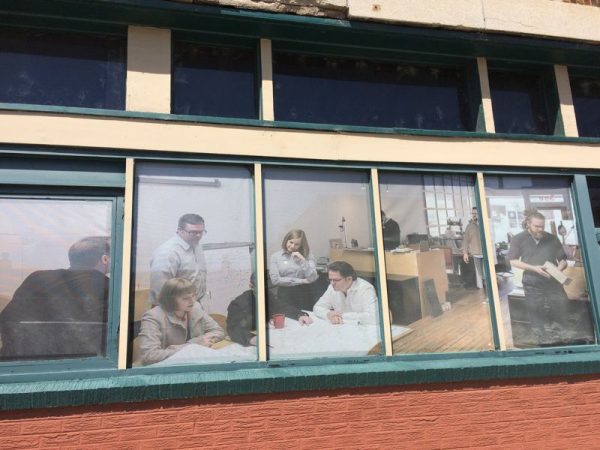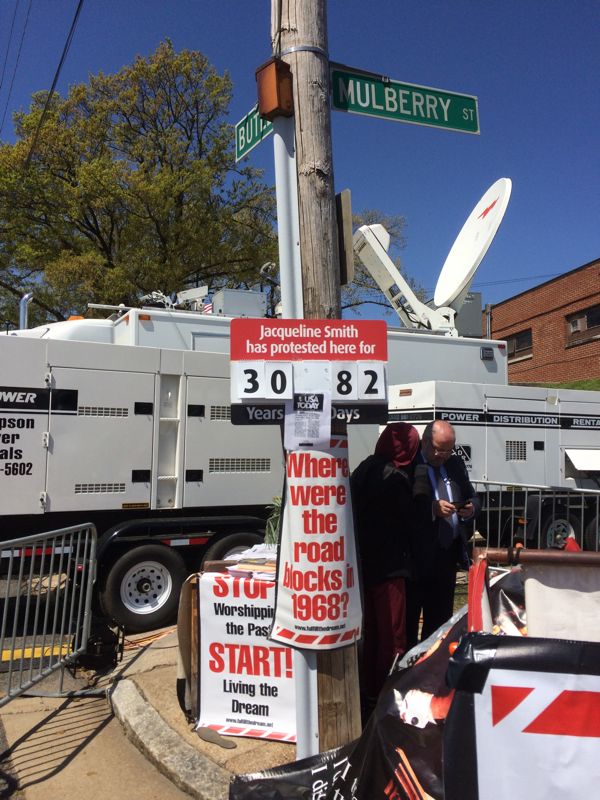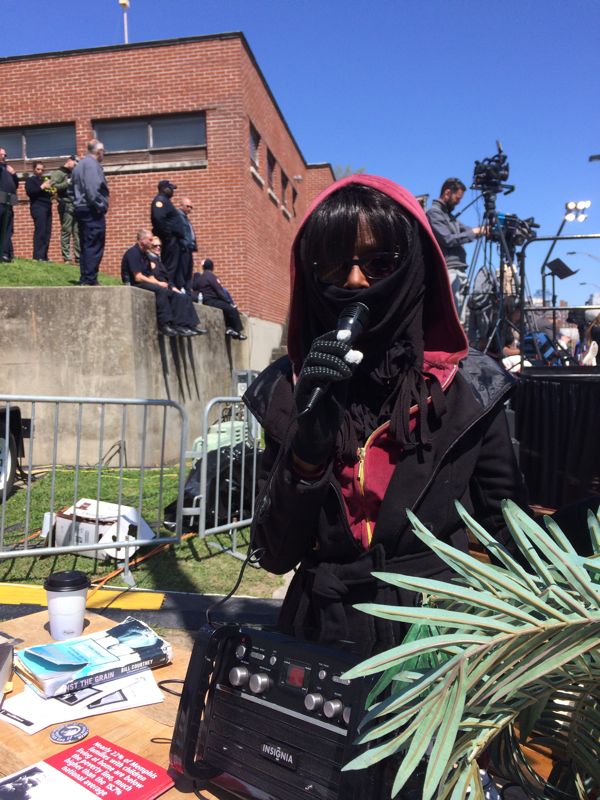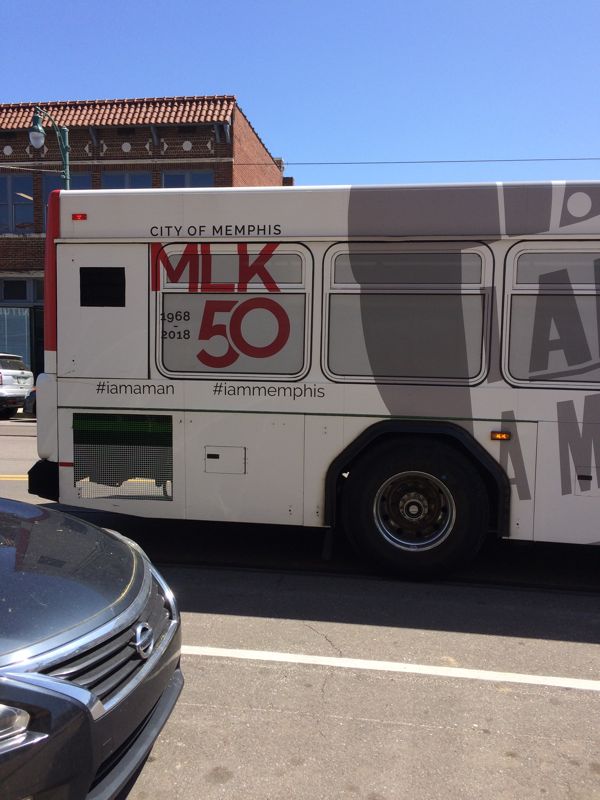I left Las Vegas on a six-day road trip to Philadelphia last spring with my friend Erika. I wanted to visit a friend in Lubbock, Texas. Erika wanted to stop in Baltimore and Fort Smith, Arkansas, to check out murals she had discovered on social media. We weren’t super-strict about the itinerary, but the one place I specifically did not want to stop was Memphis.
When I looked at the map I saw that if we left Fort Smith on Interstate 40, we would pass right through. And Fort Smith wasn’t negotiable. Okay, I can drive through Memphis, I told Erika, but I don’t want to stop. This was Erika’s first cross-country road trip, and I didn’t want her to be disappointed if we ended up driving through Memphis but didn’t stop to see Graceland or anything. (How often do you just drive by Graceland?)
We had to leave Lubbock early to reach Fort Smith, more than 500 miles later, not just on the same day but with enough good daylight left that Erika could photograph the murals. I wanted us to leave right afterward so we could get further east before stopping for the night. This is how we ended up a couple hours west of Memphis at a Quality Inn along I-40 the night before the 50th anniversary of Martin Luther King’s assassination.
Catching up on social media and news that night, I discovered the National Civil Rights Museum in downtown Memphis was hosting a slew of commemorative events the following day. While reading more about Dr. King, I stumbled onto an older article in the Washington Post about Jacqueline Smith, a woman who had been protesting the museum, and gentrification, for decades—ever since she was evicted from the Lorraine Motel, where Dr. King was killed in 1968 and where Ms. Smith lived in the late 1970s and ‘80s.
When the State of Tennessee bought the motel in order to begin renovations on what has become the museum, all of the Lorraine’s remaining residents were evicted. Dramatic photos from the time depict Memphis Police carrying a young black woman out to the street in front of the motel. Ms. Smith has remained there ever since—defiant, refusing to disappear, and speaking out.
Jacqueline Smith told the Post, “Mrs. King wanted the focus to be on King’s life, practices and the principles of Dr. King and not just focus on his death.” Thanks to the museum, which opened in 1991, she said “many blacks can’t afford to live around the Lorraine Motel” anymore. Ms. Smith has said the motel property should be used to help the poor and that her protest is an effort Dr. King would have supported.
I’ve been reading and writing and thinking a lot about gentrification for the last six years, so I was awestruck by Ms. Smith’s commitment and resolve, the power of her endurance. I wanted to witness her activism. I couldn’t believe my luck. I could just go and meet her tomorrow?! The article was from 2014, though. Would Ms. Smith be there? My anticipation was building and I started bargaining with Erika, as if she was the one who had a no-Memphis rule. “We could stop just, like, for maybe an hour, then get back on the road?” Of course, she thought I was crazy.
Blame Graceland
The last time I passed through Memphis in summer 2001, my mother was dying. I was driving home and would eventually witness this, hold her hand, and fall apart for a long time. But I made the trip from California to Pennsylvania bearable by pretending my boyfriend and I were on vacation. And because we were just “on vacation,” we stopped at Graceland, as tourists do. I walked through the “Jungle room” and other parts of the house and exited into what Graceland calls its Meditation Garden, where there are bronze headstones for Elvis and his family members. (The markers allow fans to feel that they have visited Elvis’ grave, although he is buried somewhere else.)
For all the miles from Burbank to Memphis, my mother was going to be okay, but when I reached Graceland its headstones told the truth. Standing there taking pictures, playing tourist, I suddenly felt ashamed and humiliated. For 17 years, this moment in Memphis was like a tiny box in the back of a closet, something I’ve always kept but had no wish to open. The 50th anniversary of a death was a funny time, then, to return. It also seemed an odd occasion to celebrate.
Hashtag Memphis
In 2001, my boyfriend and I probably entered Tennessee by crossing over the Mississippi River on I-55. Downtown would have been north of us as we drove beyond the city to Graceland, near the airport. Jacqueline Smith, then as now, would have been at the same corner of Mulberry Street and East Butler Avenue across from the Lorraine Motel where I was now hoping to find her.
As Erika and I crossed the Mississippi River on I-40, we passed a large pyramid on our left. Its enormous sign set a tone we found in other cities on our trip. The tone says: You are entering a business-friendly city. Whatever that means: the corporate branding overwhelms the pyramid’s distinctiveness. We spent $10 to park near the river and as we started walking towards Mulberry Street, Erika and I noticed the usual signs of gentrification. A block-size cube of bland apartments were under construction next to a charming, century-old home set back elegantly from the street. A brand-new-but-made-to-seem-old-looking neon sign advertises a local distillery. We saw old-economy businesses that were probably far less beloved than the vintage buildings with chipped, fading paint that housed them.

On Main Street, lettering on a glass door read: “Interested in development opportunities or launching a business in South Main? Contact the Downtown Memphis Commission,” with an URL and phone number. The building’s windows were covered with a photographic window-display portraying someone’s imagined future for the building. This future seems to be a group of white professionals, working together in an office.
Memphis city buses were wrapped in honor—is honor the right word?—of MLK’s assassination and featured graphics and hashtags that combined history with civic pride (#iamaman, #iammemphis).
At Mulberry Street we split up to do our own things. The museum produced a full day of scheduled events, including prominent speakers like John Lewis, who would appear later. We’d arrived at the beginning of it all, but a medium-size crowd was already milling around the closed-off block. Several dozen people waited in line to enter the museum, others listened to speakers who addressed them from a stage constructed directly in front of the Lorraine, a video wall behind them. Dr. King was killed while standing on the balcony, now just left of the stage.
30 Years, 82 Days

I spotted Jacqueline Smith’s banners at the corner, across the street. Then I saw her, behind a table displaying flyers, postcards, copies of newspaper articles. A sign counted: “Jacqueline Smith has protested here for 30 years, 82 days.” Ms. Smith addressed people who stopped to talk to her through a microphone connected to a portable audio system she was wearing—not to disrupt, but just to be heard. Jacqueline Smith wore a red hoodie under a black jacket. The hood was up and she wore dark sunglasses.
I said hello and we exchanged a couple sentences. I had a hard time understanding her, the audio system projected mostly distortion. The hopes I had for a spontaneous interview dissipated. I smiled and stepped back, feeling overwhelmed. Broadcast trucks and media tents, people addressing crowds, people standing in line, people looking for bathrooms. Jacqueline Smith was standing up for the people of Memphis at the same corner where she had been standing for them for 30 years. Now, a circus swirled around her. I watched the people of Memphis, not seeing her.

I introduced myself to Phil, a friend of Ms. Smith’s who was standing nearby. He had come from England to visit. I told him I was a writer in the middle of a road trip who’d just learned about Ms. Smith the night before. Phil pointed down the street to a block of boxy new apartments, directing me to see the museum in context, not as a building but the centerpiece of Downtown Memphis’ redevelopment. The area is now called the “South Main Arts District.”
Phil continued. “They decided, we need to sink this area down to bring it up again. So they dragged it down…Everybody turned a blind eye to that. And then it sort of went downhill. Everyone goes, oh, what a terrible place. We need to raze it to the ground.”
Dr. King’s work was so closely tied to housing justice for the poor that the Fair Housing Act passed a week after his death. The New York Times reported in 1988 that Jacqueline Smith “refused to obey an eviction order, arguing that the project would force poor people out of the neighborhood.” Social cleansing, Phil called it. He tells me the museum has spent millions to acquire the gun used to kill Dr. King, as well as the rooming house where James Earl Ray stayed when he committed the murder. The museum, inexplicably, also purchased Ray’s car. Building a shrine to a death site and not working to honor King’s life, to serve the poor, that is what Jacqueline Smith has been protesting, since even before her eviction.
The Capitalism of It All
A few weeks after I left Memphis, I read a description of the “sink it down” process Phil described in The New Urban Frontier: Gentrification and the Revanchist City, by Neil Smith. In the book, Smith describes the rent-gap theory. Owners make more money converting very-low-cost properties into high-end properties than they would if they just improved the same properties. The larger the gap between the before and after, the more money you make. When you see the logic it seems obvious, but it had until then been less obvious to me why “bad” neighborhoods are never upgraded to “good,” why longtime residents, allegedly the beneficiaries of “new urbanism,” are never allowed to enjoy the upgraded resources and services they always deserved.
It’s better for owners to ignore maintenance on their properties, to allow low-income neighborhoods to become “bad neighborhoods,” to create dilapidated and unsafe conditions, so they can slowly kick everyone out to keep them “safe” from their own neglect. Cities then use arts, culture, branding and tourism to lure new populations into these new-old neighborhoods.
As the process matures, it’s clearer and clearer it’s resegregation, in effect if not by intention. But the gentrification formula is being applied all over the country, not just in Memphis. Only in Memphis, though, is the assassination of Dr. Martin Luther King Jr. leveraged to sell condos. There is apparently no money to be made in allowing poor people to live in decent housing and stable neighborhoods with dignity.
Everything Is Beautiful and You Can Be, Too
During his final speech in Memphis, given April 3, 1968, Dr. King said, “We’ve got to stay together and maintain unity.” Capitalism is the ultimate anti-unity force, and it became a national way of life by dividing us: by making failures seem like yours alone and making successes look like yours alone and by helping validate a desire to live only for ourselves, only to fulfill our desires. Gentrification is the aesthetic projection of that individuality into lifestyle. Gentrification says, “If I can afford it, I should have it.” Capitalism suggests that power to consume is political power. What is right becomes “what I want.”
Gentrification allows us to pretend and to continue to pretend that society is just a bunch of individuals who agree that we should all have whatever our credit scores allow, and that if gentrified shops and restaurants and apartment buildings used to be the homes and businesses taken from the poor to be given to us—hey, that’s not our problem, that’s someone else’s problem. “The apartment was empty when I got here.”
None of it is true, but the shallow, poised emptiness grants us permission to think so. To co-opt something, to gentrify, is to scoop out an original meaning and replace it with another, or else none at all. It may leave a shell behind that looks like the thing, but the substance is gone. And the emptiness is important. We can insert ourselves into it, we are supposed to insert ourselves, to live the life in the glossy brochure, where no one is unpleasant (or poor!), no one is rumpled or old or dying or—and this is key—in need of anything, and certainly not from us.
Where we, and when I say we, I address mostly white people, where we are complicit in all this is that we pretend we don’t see or know when someone has done the work for us, this scooping, this taking from some other group to give to us. This pretending we are not part of the messy and unpleasant piece allows us to buy coffees from fancy shops and buy new condos and walk well-dressed dogs through Downtown Memphis while pretending not to recognize it’s all utterly absurd, and not a little bit cruel. Moving into a space that has been cleared for you requires an intentional avoidance of other people’s pain.
Jacqueline’s friend Phil had told me about a woman he met in the elevator at his hotel. She said to him, “Oh, are you here for the King celebration?”
“I suppose it depends what you mean by the word celebration,” he replied. “Isn’t that a strange choice of words?” He said she quickly went on her way.
We pretend it is not painful to turn “I am a man” into a hashtag on the side of a bus. We pretend when the anniversary of an assassination is turned into a party.

Erika and I reconnected after about an hour or so, we both felt unsettled by what I can only describe as collective pretending. As we walked back to my car, a cheery woman was passing out what appeared to be business cards; I reflexively accepted what she gave me. It was a commemorative refrigerator magnet, featuring a quote from Martin Luther King, Jr., advertising a history show on C-SPAN3.
Dangerous Unselfishness
Dr. King also said during his final speech, “Let us develop a kind of dangerous unselfishness.” And, “when people get caught up with that which is right and they are willing to sacrifice for it, there is no stopping point short of victory.”
If Jacqueline Smith’s goal was to stop the gentrification of Memphis, then victory has eluded her. But her activism is a relentless rebuke for much unanswered wrong, and it matters that she has refused to be erased. Jacqueline Smith exposes herself to the heat and cold, to rain or scorn, every day. And every day her presence invites strangers, like me, to glimpse moments of truth, even if they are painful.
Memphis will do what Memphis will do, but on every day that Ms. Smith bears witness across the street from the Lorraine Motel, she does not allow Memphis to pretend. Certainly, that is a great victory.
